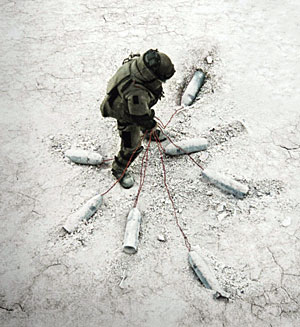 |
The buzz around the Oscars this year is all about the tussle between two of the ten Best Film nominees, the commercially successful Avatar (with a reputed $2 billion in box office earnings) versus the critically acclaimed The Hurt Locker. Of course, that Avatar's director James Cameron was once married to The Hurt Locker's Kathryn Bigelow makes for good copy. But Bigelow may have made 2009's most gripping film. The Hurt Locker is a taut thriller that's certainly superior to Avatar in most respects, and elicits troubling questions about the perception of American military action.
The Hurt Locker is set in 2004, one of the most violent years of the continuing Iraq occupation. Action is centred on a three-person team of the US army's Explosion Ordinance Disposal unit. The 'Bravo Company' has recently lost its team leader with 38 days left on its rotation. Staff Sgt. William James (Jeremy Renner) takes over, but his reckless methods have Sgt. J.T. Sanborn (Anthony Mackie) and Spc. Owen Eldridge (Bryan Geraghty) on edge. As James attempts to disarm ever more imaginative and deadlier devices of mayhem, Sanborn tries to keep them all alive.
Jerky hand-held camera work has practically become an industry standard, but Bigelow and her team deliver an immersive and thrilling experience. Her masterful grasp of suspense makes for an electric atmosphere even through long portions of inaction. The evolving dynamic between the characters and Bigelow's ability to explore their psyches raises her film to another level. The Hurt Locker may well deserve the label of the best film on the war in Iraq to date.
Of course, there have been very few successful feature films exploring the war in Iraq. There is a creeping sense, too, that many critics are united in their appreciation of The Hurt Locker on the virtue that it puts politics aside, unlike other movies about the war. Indeed, in experts who disarm explosive devices for enormous civilian casualties, we have a category of the military practically beyond reproach. But should we care whether the US soldiers portrayed are decent and sensitive (or compelling and sympathetic) when we adjudicate whether the American adventures in West Asia are just?
The frequent complaint of 'aestheticised violence' that gets lobbed at crass entertainment is often excepted by critics in the appreciation of an 'authentic' representation of violence. But the critic's conviction that we are approaching something like a real experience expresses a wish to be taken in.
James' reckless behaviour, bordering on the suicidal (not to mention his disregard for the safety of his comrades), would make him a very poor candidate for the kind of work he is doing. The supposed experiential perspective of the soldier (informed by a script by embedded journalist Mark Boal) forgoes the perspective of the native. Absent Arabs sets bombs, and in one scene reminiscent of a spaghetti western, right down to the whistling score, snipe at our heroes. None of this would be very important if The Hurt Locker were not presented, in every frame, as a simulacrum of reality.
In the final analysis, The Hurt Locker might actually share something with its competitor at the Oscars, Avatar, a work of fantasy on the moral American in a violent landscape. Doesn't our protagonist traverse the mean streets of Baghdad in rubber armour reminiscent of a spacesuit, his comrades calling him a cowboy? The American Wild West finds a home in the hot deserts of Iraq. Can we be forgiven, then, if our thoughts begin to consider what wars may have been fought over the whims and fantasies of one Texan cowboy?
The Hurt Locker
Starring: Jeremy Renner, Anthony Mackie, Bryan Geraghty
Director: Kathryn Bigelow
131 min, R.



